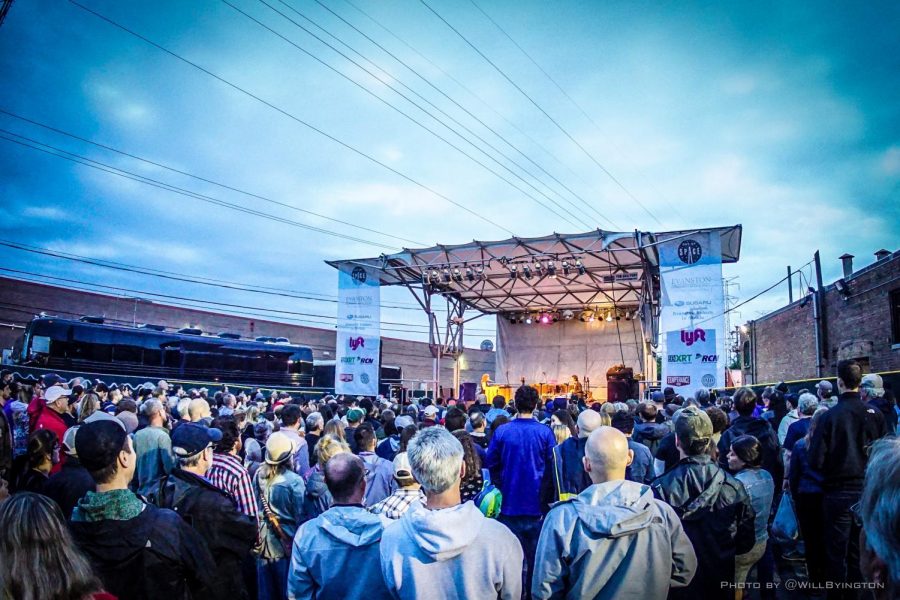Local music venues, artists struggle to stay afloat
Evanston SPACE. The live music venue has turned its parking lot into a pumpkin patch during COVID-19.
June 24, 2020
As businesses across Illinois continue to reopen, concert venues are keeping their stage doors locked.
“This is a really unique sector of business because (live music venues are) not reopening,” Jake Samuels, a talent buyer at Evanston SPACE and Chicago-based venue Thalia Hall said. “Phase 5, which is what we need to be in to resume our business as close to normal as possible, will require, more or less, a vaccine. We’re in it for the long haul.”
Evanston is on track to enter Phase 4 on June 26, which would allow venues to open with a capacity of fewer than 50 people or less than 50 percent of maximum capacity. But Samuels called reopening under Phase 4 guidelines an “impossible proposition.”
Samuels explained that it would not be economically feasible for independent venues to operate at partial capacity, in part because the expenses are too great.
Even if venues do reopen, Samuels said the “new normal” will hardly resemble typical, intimate concert settings. In addition to wearing masks and increased sanitation, concertgoers may have to reserve places in line for bathrooms, have touchless transactions and beverage deliveries to reduce crowding.
Concertgoers can also expect the demographic of artists to change. Samuels expects a lapse in touring shows due to the variability in state restrictions.
Samuels noted that while this may give emerging artists more local or regional spotlight, there may be fewer bands “taking that leap from doing it in their hometown to actually becoming full-time musicians, touring the country and the world.”
Because of the restrictions to live entertainment, artists are forced to find creative ways to perform. Pat McKillen, a singer-songwriter based in Chicago, has played shows that are anything but traditional. From performing on a gazebo to listeners docked on boats or even providing background music for a yoga class over Zoom, McKillen said that the pandemic has opened up many new ways to consume music.
“I think all artists had a deer-in-the-headlights moment in the first couple weeks of March, when everyone kind of figured out that this thing was for real and that your livelihood was essentially getting pulled,” McKillen said. “The rug was getting pulled out from underneath you.”
However, the reality that music venues are the “first to close, last to reopen”— a phrase echoed verbatim by both McKillen and Samuels, forces artists to generate revenue despite this initial shock.
In addition to producing an album remotely and hosting frequent livestreams and podcasts, McKillen has partnered with Evanston SPACE to provide To-Go Concerts, during which he and other artists can be hired to perform on patrons’ lawns.
For McKillen, music has been a valuable coping method for the unease generated from having 50 to 60 shows canceled or postponed since his last conventional gig on March 14.
“I’ve found that the best art comes out of periods of chaos and darkness,” McKillen said. “My hope is that other artists are able to channel the uncertainty into creativity and kind of make something new and beautiful out of the broken pieces that we’ve been dealt.”
Chicago-based cellist Anna Steinhoff has also performed several socially distant concerts, which she said carry a “special energy.”
“People seem even more appreciative of music right now, because it’s so scarce and because they can’t go to concerts,” she said. “It definitely makes me feel more spiritual about music.”
Steinhoff noted this newfound intimacy extends beyond the consumers. In recent months,
Steinhoff noticed that the typical competitive nature of the music industry was replaced by a wave of support among musicians.
Yet despite the creative necessity and love for performing that drive Steinhoff’s and McKillen’s musical efforts throughout the pandemic, the unprecedented economic strife wrought by COVID-19 is nonetheless a paramount motivator.
Evanston SPACE and Thalia Hall are members of the National Independent Venue Association, NIVA, a key advocate for the economic sustainability of independent music venues. On April 22, NIVA wrote to Congress stating that “for the first time in history, there is legitimate fear for our collective existence.”
Their letter asked for legislation specifically catered to the needs of music venues, including extending unemployment insurance for industry employees, granting access to additional loans and funding as well as providing rent and mortgage relief.
“I don’t think any venue operator would tell you they feel optimistic right now,” Samuels said. “NIVA was reporting that 90 percent of independent venues may not make it through six months of this.”
Yet considering the NIVA statistic that every $1 spent on ticket sales generates $12 in the community, these indefinite closures could have detrimental effects beyond the music industry.
“I hope that attention is paid to that [statistic],” Samuels said. “Not just because we’ll be real sad if our favorite club closes and because these are cultural institutions that add great value to people’s quality of life, but also because they are huge engines for the neighborhoods that they’re in.”
Email: [email protected]
Twitter: @oliviayarvis
Related Stories:
—‘It’s not a light switch’: Evanston economy buckles amid COVID-19 recession
— Sound Source: Ferret Bueller is Making Music Together, Even While Apart
— Evanston fitness trainers and studios adapt to stay-at-home order


